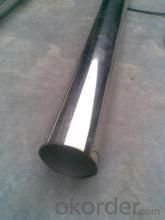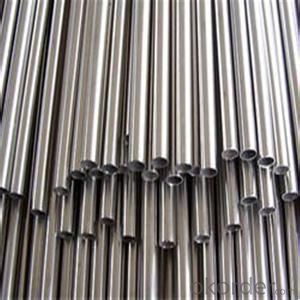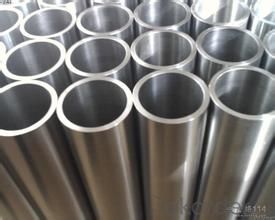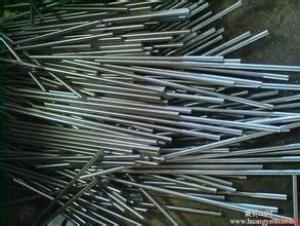Seamless Steel Pipe for Petroleum Cracking for Frozen Food
- Loading Port:
- China main port
- Payment Terms:
- TT or LC
- Min Order Qty:
- 5 m.t.
- Supply Capability:
- 4500 m.t./month
OKorder Service Pledge
OKorder Financial Service
You Might Also Like
Product Description:
Seamless steel pipe with hollow section, used as a large number of pipe conveying fluid, such as oil, natural gas, coal gas, water and some solid materials such as pipelines. Compared with steel and round steel solid steel, the torsional strength of bending is same, the weight is light, is a kind of economic section steel, widely used in the manufacture of structural parts and mechanical parts, such as the oil pipe, automobile transmission shaft, the bicycle frame and steel construction with scaffold with steel pipe manufacturing annular parts, can improve the the material utilization rate, simplify the manufacturing process, material saving and working hours, has been widely used in steel pipe manufacturing
Standard:
GB9948 Chinese national standard
Application:
Served as for furnace tubes,heat exchange tubes and pipelines in petroleum and refinery plants
Model No.of major steel tubes:
1n 9n 1Er!rMn 1rhMn 1f:hM0 etC
Diamensional tolerances:
Types of steel tubes | Outer diameter | Wall thickness | ||
Cold-rolled tubes | Tube sizes(mm) | Tolerances(mm) | Tube sizes (mm) | Tolerances(mm) |
>30~50 | ±0.3 | ≤30 | ±10% | |
>50~219 | ±0.8% | |||
Hot-rolled tubes | >219 | ±1.0% | >20 | ±10% |
Mechanical properties:
Standard codes | Models of steel tubes | 抗拉强度(MPa) | 屈服强度(MPa) | 伸长率(%) | 冲击功(J) | 布氏硬度(HB) | 交货状态 |
GB9948 | 10 | 330~490 | ≥205 | ≥24 | / | / | 正火 |
20 | 410~550 | ≥245 | ≥21 | ≥39 | / | 正火 | |
15CrMo | 440~640 | ≥235 | ≥21 | ≥47 | ≤170 | 正火加回火 | |
1Cr2Mo | ≥390 | ≥175 | ≥22 | ≥92 | ≤179 | 正火加回火 | |
1Cr5Mo | ≥390 | ≥195 | ≥22 | ≥92 | ≤187 | 退火 |
Chemical composition:
Standard codes | Models of steel tubes | Chemical compositions(%) | |||||||
C | Si | Mn | P | S | Cr | Mo | Ni | ||
GB9948 | 10 | 0.07~0.14 | 0.17~0.37 | 0.35~0.65 | ≤0.035 | ≤0.035 | ≤0.15 | / | ≤0.25 |
20 | 0.17~0.24 | 0.17~0.37 | 0.35~0.65 | ≤0.035 | ≤0.035 | ≤0.25 | / | ≤0.25 | |
15CrMo | 0.12~0.18 | 0.17~0.37 | 0.40~0.70 | ≤0.035 | ≤0.035 | 0.80~1.10 | 0.40~0.55 | ≤0.30 | |
1Cr2Mo | ≤0.15 | 0.50~1.00 | 0.30~0.60 | ≤0.035 | ≤0.030 | 2.15~2.85 | 0.45~0.65 | / | |
1Cr5Mo | ≤0.15 | ≤0.50 | ≤0.60 | ≤0.035 | ≤0.030 | 4.00~6.00 | 0.45~0.60 | ≤0.60 | |
FAQ of Seamless Pipe :
①How is the quality of your products?
Our products are manufactured strictly according to national and internaional standard, and we take a test on every pipe before delivered out. If you want see our quality certifications and all kinds of testing report, please just ask us for it.
Guaranteed: If products’ quality don’t accord to discription as we give or the promise before you place order, we promise 100% refund.
②How about price?
Yes, we are factory and be able to give you lowest price below market one, and we have a policy that “ for saving time and absolutely honest business attitude, we quote as lowest as possible for any customer, and discount can be given according to quantity”,if you like bargain and factory price is not low enough as you think, just don’t waste your time.Please trust the quotation we would give you, it is professional one.
③Why should you chose us?
Chose happens because of quality, then price, We can give you both.Additionally, we can also offer professional products inquiry, products knowledge train(for agents), smooth goods delivery, exellent customer solution proposals.Our service formula: good quality+good price+good service=customer’s trust
SGS test is available, customer inspection before shipping is welcome, third party inspection is no problem.
Any question, pls feel free to contact us !
Seamless Pipe Images:



- Q:How do steel pipes handle abrasive materials?
- Steel pipes are highly durable and resistant to abrasion, making them well-suited to handle abrasive materials. The smooth interior surface of steel pipes minimizes friction and wear caused by the movement of such materials, ensuring their efficient and effective transportation.
- Q:Can steel pipes be used for offshore oil and gas platforms?
- Offshore oil and gas platforms can utilize steel pipes, as they are known for their durability, strength, and ability to withstand harsh marine conditions. These pipes are typically constructed from high-quality steel alloys, capable of enduring the immense pressures and temperatures of offshore drilling and production activities. Moreover, steel pipes offer versatility and easy welding, facilitating the creation of intricate pipeline networks on offshore platforms. Furthermore, protective coatings like epoxy or anti-corrosion coatings can be applied to steel pipes, bolstering their resistance to corrosion and extending their lifespan in the offshore environment. In summary, steel pipes are a reliable and extensively employed option for transporting oil and gas on offshore platforms.
- Q:Can steel pipes be used for conveying hazardous chemicals?
- Certainly, hazardous chemicals can indeed be conveyed through the use of steel pipes. Renowned for their exceptional strength and durability, steel pipes are ideally suited for the handling of various substances, including those that are hazardous. Their ability to withstand both high pressure and temperature ensures the secure transportation of these chemicals. Furthermore, steel pipes possess outstanding resistance to corrosion, a critical factor when dealing with potentially dangerous and corrosive materials. In addition, the ease with which steel pipes can be welded and connected allows for the establishment of a dependable and impervious transport system. Nevertheless, it is imperative to carefully consider the specific requirements of the chemicals being transported and diligently ensure that the steel pipes are appropriately designed, coated, and maintained, thereby averting any potential risks or reactions that may arise with the hazardous substances.
- Q:Is the steel frame on each floor supporting formwork (floor) called full scaffolding?
- The use of scaffold as its height, when the ceiling height below 3.6M, no matter what the ceiling decoration, decorative scaffolding are calculated
- Q:What is the difference between black steel pipe and galvanized steel pipe?
- The main difference between black steel pipe and galvanized steel pipe lies in their coating. Black steel pipe is untreated and has a dark, matte appearance, while galvanized steel pipe is coated with a layer of zinc to prevent rusting and has a silver, shiny appearance. This coating makes galvanized steel pipes more durable and suitable for outdoor use, while black steel pipes are commonly used for indoor plumbing and gas lines.
- Q:How are steel pipes protected against external moisture?
- Steel pipes can be safeguarded against external moisture in various ways. One commonly employed method involves applying a protective coating or paint to the pipe's surface, which acts as a barrier to prevent direct contact with moisture. Depending on the specific requirements and environment, this coating can be composed of different materials like epoxy, polyethylene, or zinc. Another means of protection is through the utilization of corrosion inhibitors. These inhibitors are added to either the internal or external surfaces of the pipes, creating a protective layer that hinders moisture-induced corrosion. Chemicals like rust converters or rust preventatives are examples of corrosion inhibitors that react with the steel, forming a protective barrier. Cathodic protection is an additional technique utilized to shield steel pipes from external moisture. This technique involves the use of sacrificial anodes or impressed current to generate an electric current that safeguards the steel. Sacrificial anodes, typically made of zinc, aluminum, or magnesium, are attached to the steel pipes and corrode over time instead of the steel, thereby preventing moisture-induced corrosion. Moreover, proper insulation and waterproofing measures play a vital role in protecting steel pipes from external moisture. To provide an extra layer of protection and prevent moisture infiltration, insulation materials like foam or tape are applied to the pipes. Waterproofing measures such as sealants or membranes can also be implemented to ensure no moisture seeps into the pipes. Regular maintenance, including inspections and repairs, is crucial for ensuring the continuous protection of steel pipes against external moisture. By promptly addressing any areas of damage or corrosion, the integrity of the protective measures can be maintained, thereby extending the lifespan of the steel pipes and avoiding costly repairs or replacements in the future.
- Q:How are steel pipes used in the manufacturing of pressure vessels?
- Steel pipes are commonly used in the manufacturing of pressure vessels due to their high strength and ability to withstand high pressure. These pipes are utilized as the primary material for constructing the shell of the pressure vessel, providing a robust and reliable structure. Additionally, steel pipes offer excellent resistance to corrosion, making them suitable for various industries and applications where pressure vessels are required, such as oil and gas, chemical processing, and power generation.
- Q:Can steel pipes be used for conveying potable water?
- Yes, steel pipes can be used for conveying potable water. However, there are some considerations and precautions that need to be taken into account. Steel pipes are strong and durable, making them suitable for transporting water over long distances. They are also resistant to corrosion and can withstand high pressure. To ensure the safety and quality of the water being transported, it is important to use pipes that are specifically designed and manufactured for potable water applications. These pipes are often coated or lined with materials that prevent the leaching of contaminants into the water, such as epoxy or cement mortar lining. Additionally, regular maintenance and inspections should be conducted to prevent the buildup of sediments or rust that could affect the water quality. It is worth noting that steel pipes can be more expensive compared to other materials like plastic or copper. However, their longevity and reliability make them a cost-effective choice in the long run. It is also important to comply with local regulations and standards regarding the use of steel pipes for conveying potable water to ensure the health and safety of consumers.
- Q:How are steel pipes used in the manufacturing of conveyor systems?
- Steel pipes are commonly used in the manufacturing of conveyor systems as they provide a strong and durable structure for transporting materials. These pipes are used to create the framework and support structure of the conveyor system, allowing for the smooth movement of goods from one place to another. Additionally, steel pipes can be welded together to create longer sections, making them ideal for constructing lengthy conveyor systems.
- Q:Can steel pipes be insulated for thermal efficiency?
- Yes, steel pipes can be insulated for thermal efficiency. Insulating steel pipes helps to reduce heat loss or gain, depending on the application. The insulation material is typically wrapped around the pipes to create a protective barrier. This helps to prevent heat transfer from the pipes to the surrounding environment or vice versa. Insulating steel pipes can significantly improve energy efficiency by reducing the amount of energy required to heat or cool the fluid flowing through the pipes. It is a common practice in various industries such as HVAC, oil and gas, and industrial processes where temperature control is critical. Additionally, insulation also helps to prevent condensation and corrosion on the outer surface of the pipes. Overall, insulating steel pipes is a cost-effective solution to enhance thermal efficiency and reduce energy consumption.
1. Manufacturer Overview |
|
|---|---|
| Location | |
| Year Established | |
| Annual Output Value | |
| Main Markets | |
| Company Certifications | |
2. Manufacturer Certificates |
|
|---|---|
| a) Certification Name | |
| Range | |
| Reference | |
| Validity Period | |
3. Manufacturer Capability |
|
|---|---|
| a)Trade Capacity | |
| Nearest Port | |
| Export Percentage | |
| No.of Employees in Trade Department | |
| Language Spoken: | |
| b)Factory Information | |
| Factory Size: | |
| No. of Production Lines | |
| Contract Manufacturing | |
| Product Price Range | |
Send your message to us
Seamless Steel Pipe for Petroleum Cracking for Frozen Food
- Loading Port:
- China main port
- Payment Terms:
- TT or LC
- Min Order Qty:
- 5 m.t.
- Supply Capability:
- 4500 m.t./month
OKorder Service Pledge
OKorder Financial Service
Similar products
New products
Hot products
Hot Searches
Related keywords































